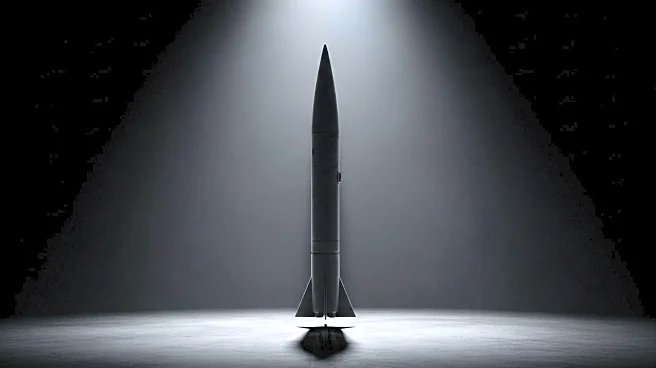What is the story about?
What's Happening?
North Korea showcased a new intercontinental ballistic missile (ICBM) during a military parade marking the 80th anniversary of the ruling Workers' Party. The event, attended by foreign dignitaries, highlighted North Korea's growing diplomatic presence and its continued focus on expanding its nuclear arsenal. The new missile, named Hwasong-20, is described as the country's most powerful nuclear strategic weapon system. North Korean leader Kim Jong Un emphasized the need for his military to become an 'invincible entity' capable of neutralizing threats. The parade also featured other weapons, including shorter-range ballistic and cruise missiles, which North Korea claims can deliver nuclear strikes against South Korea.
Why It's Important?
The unveiling of the Hwasong-20 ICBM underscores North Korea's ongoing efforts to enhance its military capabilities, potentially increasing tensions with the United States and its allies. The missile's development suggests a focus on creating multi-warhead systems to bypass missile defenses, posing a direct threat to the U.S. mainland. The presence of high-level foreign officials at the parade, including representatives from China and Russia, indicates North Korea's strategic alignment with these nations against Western powers. This development could further complicate diplomatic efforts to address North Korea's nuclear ambitions, especially as Kim Jong Un continues to reject dialogue with Washington and Seoul.
What's Next?
North Korea may conduct tests of the Hwasong-20 in the coming weeks, which could provoke international condemnation and lead to increased sanctions. The U.S. and its allies might respond by bolstering missile defense systems and conducting military exercises in the region. Diplomatic efforts to engage North Korea could face additional hurdles, as Kim Jong Un has made clear his intention to maintain and expand his nuclear arsenal. The international community will likely continue to monitor North Korea's actions closely, seeking ways to mitigate the potential threat posed by its growing military capabilities.
Beyond the Headlines
The parade and missile unveiling highlight the ethical and security challenges posed by North Korea's military advancements. The country's focus on developing weapons capable of reaching the U.S. raises questions about global nuclear non-proliferation efforts and the effectiveness of existing sanctions. Additionally, North Korea's alignment with Russia and China could shift geopolitical dynamics, influencing regional security and diplomatic relations. The situation underscores the need for a coordinated international response to address the risks associated with North Korea's military developments.
















